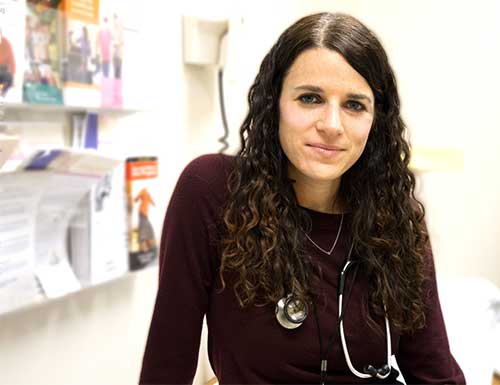This November, a new wave of medical residents matched to UBC subspecialty residency positions, as part of the annual CaRMS Medicine Subspecialty Match (MSM)
By Kerry Blackadar, UBC Postgraduate Medical Education

It was a Thursday like any other. That was, until news of the match results arrived. “I was actually with a patient when I found out,” says Anna Hayden, a third-year UBC internal medicine resident, who was recently accepted into UBC’s hematology residency program.
Over the next two years, Dr. Hayden will gain specialized training to treat B.C. patients with blood conditions, such as anemia and hemophilia, as well as blood cancers, like leukemia.
“Hematology is fascinating medicine, and it’s a very exciting time to be entering the field because we’re witnessing a lot of research advancements and the development of novel therapies for patients,” says Dr. Hayden, who grew passionate about the field after gaining exposure to patients with blood disorders during her time as a general internal medicine resident.
But Dr. Hayden is not the only one celebrating the opportunity to further hone her medical skills. In fact, she’s among a group of 42 residents who were recently matched to UBC subspecialty residency positions as part of the annual Canadian Resident Matching Service (CaRMS) Medicine Subspecialty Match (MSM), designed for internal medicine residents looking to enter subspecialty training programs across the country.
“While the next few years are really about focusing on becoming an expert in a particular field, we’ll also be able to practice as general internists, working in health care settings across the province,” notes Dr. Hayden, who is excited by the prospect of incorporating research into her clinical work in the years to come.
Of the 42 available subspecialty positions at UBC, 100 per cent were filled in the first round. “It’s wonderful to see such strong results — it’s a real testament to the strength of postgraduate medical education here at UBC,” says Dr. Roger Wong, Associate Dean of Postgraduate Medical Education. The newly-matched residents will join a number of subspecialty programs at UBC — including geriatric medicine, general internal medicine, and medical oncology. Over the course of their training, residents will gain specialized skills and expertise to help address specific health care needs associated with British Columbia’s growing, and aging population.
Of the 42 UBC subspecialty positions, nearly 70 per cent were filled by current UBC residents. In addition, nearly two thirds of UBC residents who matched to UBC subspecialty programs also completed their medical school training at UBC.
“It’s very exciting to see our medical students continue their journey to residency and practice right here in BC,” Dr. Wong says.
While the results of this year’s subspecialty match are encouraging, Dr. Wong is also excited by the expanded number of trainees pursuing family medicine and generalist specialties, which have both witnessed a steady rise in the number of trainees in recent years.
Over the past decade, UBC’s expansion and distribution of medical education programs have significantly increased the number of physicians trained in British Columbia. Today, over 1,400 medical trainees are pursuing postgraduate medical education at more than 100 sites across the province. UBC’s Family Medicine Residency Program — now the largest in Canada — accounts for the largest number (nearly half) of UBC residency positions.